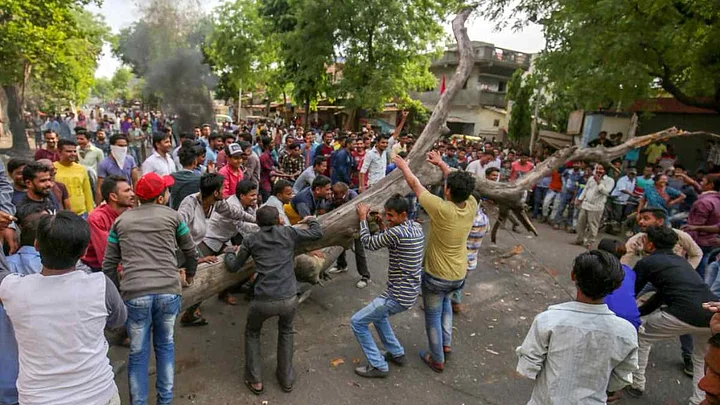Dalit groups in Gujarat took to the streets on 2 April to protest what they alleged was a dilution of Scheduled Castes and Scheduled Tribes (Prevention of Atrocities) Act, 1989, by the Supreme Court. Protestors in the thousands disrupted road and rail traffic, shut down shops, and engaged in arson to enforce the call for ‘Bharat Bandh’.
The protests in Gujarat did not witness the mayhem seen across northern India, which resulted in the deaths of nine persons. However, there were reports of attacks on police personnel in the state. Around 50 cases of arson were registered in Gujarat. The ST and BRTS bus services reported losses to the tune of over Rs 20 lakh because of vandalism.
The Dalit community makes up 7 percent of the Gujarat population; and Dalits do not lead in terms of numbers in the 13 Assembly constituencies reserved for SC. Yet, what happened on 2 April marks a new chapter in the Dalit movement of Gujarat.
No Relief from Upper Caste Violence
In the last week of March, Pradeep Rathod, a 21-year-old Dalit resident of Bhavnagar district, was bludgeoned to death by men from the Darbar community, reportedly for owning and riding a horse.
Three people were arrested. Later, the District Superintendent of Police claimed that Rathod was not killed for owning a horse as alleged in the FIR, but for eve-teasing local girls.
In October 2017, Jayesh Solanki, a Dalit teenager was killed for attending a Garba event in Anand district. In the same month, Digant Maheriya, a 16-year-old Dalit resident of Limbodara village, was attacked, weeks after his cousin was allegedly assaulted by upper caste members for sporting moustaches.
Dalit groups view the 20 March Supreme Court amendment of the Scheduled Castes and Scheduled Tribes (Prevention of Atrocities) Act, 1989, as a dilution of a constitutional shield. In its order, the SC said that the arrest of an accused under the Act is not mandatory and that a recourse to coercive action would be taken only after preliminary inquiry and sanction by the competent authority.
A review petition was filed but the court refused to budge on the five directions it issued on 20 March. “We are not against the law or its implementation,” the court said on 3 April.
The apex court stressed that the directions in no way diluted the law and said that they were instead aimed at protecting innocent people from being punished. It describe its direction for preliminary inquiry before an FIR is registered on a complaint as a “filter”.
"People who are agitating have not read the order. There is a lot of hearsay,” observed Justice Goel.
According to Martin Macwan, founder of the Navsarjan Trust, the Dalit community feels threatened by the government and judiciary’s methods to disarm those who belong to the reserved category. Macwan told The Quint: “There is a perception among Dalits that this dilution in the atrocities act has been orchestrated by the Centre, by keeping its gun on the Supreme Court’s shoulder, thereby absolving themselves off the SC judgement”.
This perception is growing stronger each day and fueled by the RSS’ observations demanding the scrapping of the entire reservation system.Martin Macwan, founder of the Navsarjan Trust
Juxtaposing Orders on Padmavat and SC/ST
The Bharat Bandh comes months after nationwide protests over the release of Sanjay Leela Bhansali’s film, Padmavat. Juxtaposing the SC order on Padmavat with that of its directive on the dilution of SC/ST Act, Macwan says: “When the movie Padmavat was green lighted by the Supreme Court across India, the Gujarat government decided otherwise and continued with its ban. Now the government says we should accept the SC order (on atrocity case) in the right spirit. Does the government think that people are not observant?”
In wake of the SC order on Padmavat, the Rajput community wreaked havoc on the streets of Ahmedabad and across the nation.
Responding to a Nationwide Call
According to Professor of Sociology at Gujarat University, Gaurang Jani, this is the first time that the Dalits of Gujarat have had an opportunity to participate in the Dalit movement at the national level. However, Jani told The Quint that the desired mobilisation is still not seen as the population of Dalits in the state is just 7 percent.
“If you ask me, the middle-class Dalits stayed away from the protests and the bandh call. Mobilisation was seen from many parts of the state. But to be honest ,the population of Dalits is so small that a real movement could not envisaged and thus we saw violence break out the way it did.”
I feel the Dalit groups have not read the SC judgement clearly and neither has any political party taken interest in interpreting the law to them clearly. Someone like Jignesh Mewani can only do so much.Gaurang Jani, Professor of Sociology at Gujarat University
He added that the Dalits of Gujarat can no longer afford to rely on the BJP or the Congress. “The Dalit leaders of BJP are not longer Dalit leaders; they are BJP leaders. As for Congress, they have not immersed themselves in the Dalit issues and only supported Mewani,” said Jani, adding that it made more sense to the Dalits of Gujarat to seek political relevance during the Bharat Bandh.
(At The Quint, we question everything. Play an active role in shaping our journalism by becoming a member today.)
